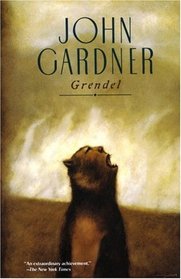Being an english teacher and studying Beowulf, this point-of-view reversal is amazing!
Helpful Score: 3
It was really different reading for me, but I enjoyed it.
Helpful Score: 2
My son had to read this in his high school British Literature class so I thought I'd give it a go and it is WAY better than Beowulf, which I had to read! Grendel is a sympathetic monster whose observations on humans are cagily insightful, and the Zodiac theme makes the book more enjoyable if you know to look for it. Recommended.
Helpful Score: 2
An unusual adaptation of Beowulf ledgend as written from the Monster's point of view. Man's natural instinct to kill what he doesn't understand is oft-times the impetus to the monsterous nature of the beast. Grendel deserves his say and gets it in this slim volume as told from the other side of the nightmare.
Helpful Score: 1
I always feel bad for beowulf and grendel, but well written and liked.
Helpful Score: 1
This book was depressing. It's the world through a monster who hates happiness and light's view.
Blech. I REALLY didn't liked this book. I've had it since my junior year of high school, from when we read _Beowulf_ and I think I bought it to read for extra credit, or because I had genuinely liked _Beowulf_... but I never read it. We rented the movie _Beowulf_ so I decided to read it. I fount it to be very boring... so boring, in fact that I almost didn't finish it. Maybe if I had read _Beowulf_ more recently... well, I don't know, but really, it was boring!
The monster from the epic Beowulf tells his own story. Interesting.
A bit hard to read, but all in all not bad
Grendel retells the story of Beowulf from the point of view of the monster, I think one of the first books to try this approach. It's obviously meant as satire - it absolutely eviscerates the human tendency to justify killing others while calling *them* killers - but unlike most satires, you get genuinely caught up in the story and with Grendel.
The monster Grendel is a huge, hairy mass of angst, with not much in the way of brainpower, but with a scathing wit and no tolerance for bulls**t. A born carnivore, he has nothing but contempt for puny humans and their need to create gods to justify simple power-grabbing. And yet, alone as he is, he craves the company of other sentient beings and is drawn to the transformative magic of human myth-making. His dilemma is unsolvable, but his frustration is comic gold.
The story does slow a bit in the middle as Grendel gets more interested in the metaphysics of history, but it's a short book and well worth pushing through to the end.
Many years after I read this book, I picked up "Wicked", which I thought would be a similar retelling of the Wizard of Oz from the monster's perspective, but I hated "Wicked". "Grendel" is much, much better.
The monster Grendel is a huge, hairy mass of angst, with not much in the way of brainpower, but with a scathing wit and no tolerance for bulls**t. A born carnivore, he has nothing but contempt for puny humans and their need to create gods to justify simple power-grabbing. And yet, alone as he is, he craves the company of other sentient beings and is drawn to the transformative magic of human myth-making. His dilemma is unsolvable, but his frustration is comic gold.
The story does slow a bit in the middle as Grendel gets more interested in the metaphysics of history, but it's a short book and well worth pushing through to the end.
Many years after I read this book, I picked up "Wicked", which I thought would be a similar retelling of the Wizard of Oz from the monster's perspective, but I hated "Wicked". "Grendel" is much, much better.
The first and most terrifying monster in English literature, from the great, early epic, Beowulf, tells his own side of the story in a book William Gass called "one of the finest of our contemporary fictions"
Beowulf tells his OWN side of the story in a book William Gass called "one of the finest of our contemporary fictions."




![header=[] body=[Get a free book credit right now by joining the club and listing 5 books you have and are willing to share with other members!] Help icon](/images/question.gif?v=90afaeb39)
